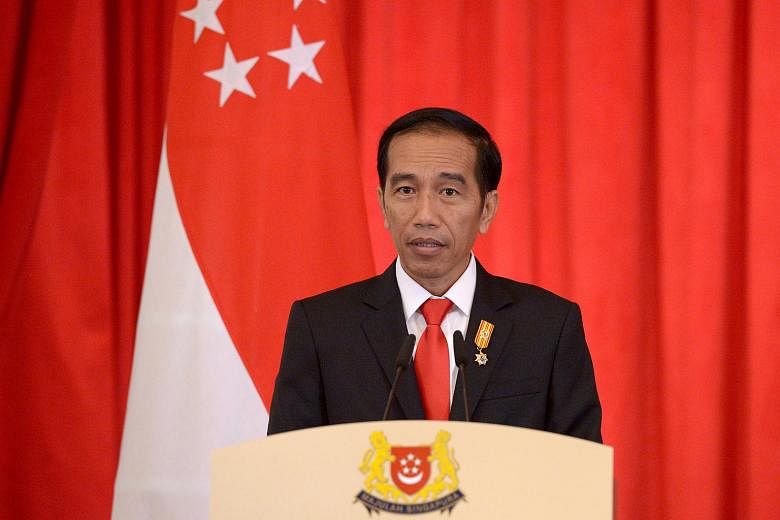South Jakarta resident Armand Hartono was unemployed for most of last year after he was retrenched from his job at a car dealership.
The 43-year-old would have remained among Indonesia's 7.56 million unemployed had he not found work as a driver in October.
Others have not been as lucky in Indonesia, where growth last year was hit by a global economic downturn, a depreciating rupiah and plummeting commodity prices.
Most forecasts indicate that the country under President Joko Widodo will narrowly miss its 5 per cent growth target for last year.
Many Indonesians like Mr Armand, who are somewhat indifferent to the often public bickering among the country's political elite, say they just want the President to turn the economy around this year.
-
The year ahead
-
• The government's infrastructure projects are expected to give the economy a fillip.
• The Joko administration has to make good on its pledge to tackle the root cause of last year's transboundary haze, which could cost Indonesia up to 475 trillion rupiah (S$48.6 billion).
"The economy under Jokowi has not been good, I hope he will do better in 2016," said Mr Armand, referring to the President's moniker.
A flagging economy, a government on the cusp of a second Cabinet reshuffle in less than a year and the rising threat of terrorism are among the national issues Mr Joko will need to grapple with.
All that while having to deliver on a promise to restore millions of hectares of forest and peatlands and prevent a repeat of last year's transboundary haze crisis.
How Indonesia tackles the root cause of the haze in the next 12 months will have an impact on its economic growth, say observers.
The World Bank in its latest report said Indonesia's growth last year was "negatively affected by an economic and environmental crisis which was caused by man-made fire and haze".
Mr Bustar Maitar, global head of Greenpeace's Indonesia Forest Campaign, had said in September the Joko administration has calculated that the crisis would set Indonesia back by up to 475 trillion rupiah (S$48.6 billion).
-
A new year could mean new beginnings for nations looking for a fresh start. New leaders will be elected in the United States and the Philippines. But there is also a sense that more of the same is the way forward.
But most economists believe the country has a good chance of generating higher growth this year.
"There are signs the govern- ment's infrastructure programmes are taking off more rapidly than before, with cement sales and budget disbursement rate on the uptick," OCBC Bank economist Wellian Wiranto told The Sunday Times.
"However, the 5.1 per cent that we are projecting for 2016 - while higher than (2015's) probable 4.8 per cent - is still a lot less than what the country can achieve."
Mr Wiranto said to boost growth, Mr Joko will need to ensure his infrastructure blueprint is carried out.
Infrastructure projects include power plants, roads, seaports, rail networks, airports and dams. Funds for infrastructure development were raised from 290 trillion rupiah last year to a historical high of 312 trillion rupiah for this year.
Finance Minister Bambang Brojonegoro told The Jakarta Post that infrastructure projects contributed to growth through related industries such as construction, which chalked up 6 per cent growth.
The Indonesian Employers Association (Apindo) also expects a brighter business outlook as government efforts to deregulate and cut bureaucracy begin bearing fruit.
Manufacturing contributed the most - about 20 per cent - to growth, followed by trade and agriculture. Apindo chairman for the industrial sector, Mr Johnny Darmawan, said manufacturing is poised to grow between 10 per cent and 20 per cent, higher than last year's 6.1 per cent.
Indonesia has also stated that it intends to join the Trans-Pacific Partnership, but the impact of its membership, if it materialises, on growth will be limited, said the World Bank.
With China and Europe experiencing slowdowns, Indonesia will undoubtedly look to enhance its domestic economic prospects, driven by state spending on developmental projects at home.
The World Bank's country director for Indonesia Rodrigo Chaves said Mr Joko's commitment towards more public investments in infrastructure, health, and social assistance programmes is welcomed.
"It could strengthen growth prospects as well as help the poor and vulnerable," he added. "If reforms are sustained and implementation is effective, Indonesia may be buffered from potential volatility and enjoy higher growth in 2016."

